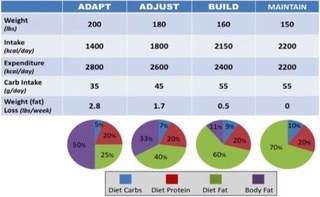
I think there is some confusion over what the chart means, or at least recommendations that might be assumed from it.
Protein percentage is going to say the same, carb intake changes slightly, the rest comes from fat.
In the beginning he is saying you need to eat 1400 calories even though you are burning 2800, quite the deficit.
2,8000.2=560 calories from Protein, or 140 grams.
2,8000.25=700 calories from Fat, 77.77 grams.
2,800*0.05=140 calories from Carbs, 35 grams.
This is 1,400 calories, all of your intake, go to bed, watch TV whatever. But just being alive burns 2,800 calories, which means after the 1,400 you ate is gone, the rest has to come from your body, which is the 50%.
Adjust is
2,6000.2=520 calories from Protein
2,6000.4=1,040 from Fat
2,600*0.07=182 from Carbs
This is 1,742 which he appears to have rounded for simplicity. You burned 2,600 though so the rest is obtained from body fat.
He doesn’t recommend staying at a 50% deficit forever even though that would lose more weight faster, why not? It is not really sustainable, especially as Richard pointed out there is a limit on how many calories you can get from body fat in a day. If you are having less and less fat on your body which is producing less and less energy, what has to happen? You are at your carb limit, you don’t need more protein, that means there is only one lever left: fat.
Build is
2,4000.20=480 from Protein
2,4000.11=264 from Fat (the body can provide less and less as we lean down)
2,400*0.09=216 from Carbs
That is 960 calories. If you only eat these things you can see that you can’t access enough fat and your metabolism will crash, so what do you do? The remaining 1,440 calories has to come from diet.
Maintain is
2,2000.2=440 from Protein
ERROR: Not enough fat
2,200.1=220 from Carbs
That is 660 of the 2,200 you need. Eating more carbs or protein is the wrong thing, the only thing you can do now to maintain is eat the rest in fat.
Eating more and more fat is not a rule we are trying to follow, it is how the math works, if you are burning calories they have to come from somewhere, as your body produces less and less energy you have to add it from external sources, and the only one remaining is fat.
The argument about satiety is separate to me. All this chart is saying is that you eat at a deficit and your body will burn the remainder it needs from existing fat stores. As you increase your intake back to normal, or at least maintenance levels, your existing fat stores shrink until all fat must come from diet.







